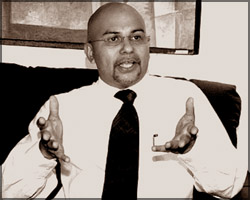
Honesty, integrity and credibility differentiate boys from men
Dian Gomas is the CEO of MAS Holding and the President of Sri
Lanka Ameteur Boxing Association and Vice President of National Olympic
Committee.
Tell us about your educational background with regard to business.
I am a Fellow Member of the Chartered Institute of Management
Accountants (FCMA) UK.
I also received my Executive Education at the Harvard and Wharton
Business Schools.
What made you to join a textile company following on your education
of being Chartered (CIMA) Management Accountant?
I started my career as a management trainee at KPMG Ford Rhodes in
the early 1980’s.
By 22 I was a Financial Controller at a British Interior Company
based in Sri Lanka.
I was appointed Finance Director by 26 and moved on to the Fortune
100 Company May Corporation Inc. as the General Manager in Sri Lanka.
 My foray into apparel industry was by chance on meeting with
Deshamanya Mahesh Amalean, a visionary who would go on to shape the Sri
Lankan apparel industry in the years to come. It was due to Mahesh’s
influence that I joined MAS Holdings in 1990. My foray into apparel industry was by chance on meeting with
Deshamanya Mahesh Amalean, a visionary who would go on to shape the Sri
Lankan apparel industry in the years to come. It was due to Mahesh’s
influence that I joined MAS Holdings in 1990.
He had vision and passion to put Sri Lanka on the world map in the
apparel industry. He was my inspiration to enter the industry, which led
to make the transformation from being a master of numbers to a leader of
men.
What are the attributes of a successful business person?
To be successful, you need to be passionate in what you do. This
applies to business as much as it does to life in general. In business
you have to face incessant ups and downs and you have to learn from
them. You need to be strong when you are encountered with adversity and
trust your intuition.
Honesty, integrity and credibility are the key to success in the long
run. These are the factors that will differentiate the boys from the
men. Successful businessmen are aggressive and ambitious. They are the
‘go getters’. It’s important that you play hard, play smart and play
fair!
How do you balance personal life and work?
I can manage to switch gears from one role to another very easily.
Today I head one of the largest intimate apparel companies in the region
as Chief Executive of 14,000 employees. I also serve as the President of
Sri Lankan Boxing, Vice President of the National Olympic Committee & an
Ex-Co Member of Sri Lanka Cricket.
I also run my own art store, Gandhara a retail business specializing
in Crafts and Artifacts. Despite my busy schedule I still find time to
conduct lectures and motivational speeches every month at various forums
sharing my learning and life experiences with the youth. Playing
different roles is not easy, but is something which has a high value.
Did you take part in any sport at School?
Yes. Boxing has been a lifelong passion for me since my schooldays at
Royal College, Colombo, where I was the reigning junior national fly
weight champion for four consecutive years.
How do you motivate your employees?
They are my strength and my inspiration! I treat them as my own
children. They too look up to me as a father who extends support and
guidance. They know that I will never compromise on them so they
appreciate very much and maintain their loyalty and faithfulness towards
their boss and the company. that I will never compromise on them so they
appreciate very much and maintain their loyalty and faithfulness towards
their boss and the company.
What motivates you to work?
I am motivated in making a difference in the lives of those who work
under me and other people as well. My job provides me the opportunity to
help the under privileged in the country.
I think I am very successful in making that happen. I have sent many
youth through school and university, groomed budding sportsperson to be
world beaters. I have seen how they strive to make ends meet. I consider
it as a responsibility to provide these people with the best opportunity
to succeed in life. This is my inspiration and motivation.
If there’s a dispute or a conflict among your workers, how are you
going to solve it?
My approach to resolving conflict is quite similar to the approach
that I would take at home because I treat my staffers as my own
children. I deal with it directly as unhurtful and as possible.
Sometimes I am brutally forthright and harsh with them, especially
the senior management. I am not a dictator and try to deal with
emotional conflicts in a moderate and humane manner.
Don’t you experience stress when the work is piled up?
I have always performed better under pressure. I am in my element in
times of crisis and change. It is said that ‘when the going gets tough,
the tough get going’ and this is an adage that I stand by. I always put
people through challenges to see how they cope with them. Anyone can be
a ‘good weather manager’ but only the best has what it takes to whither
the storm and come through winning.
Do you think experience alone will be sufficient to excel in the
business field without paper qualifications?
You need both. Solid educational background is the foundation of
success in corporate life.
However it is important to note that paper qualifications are only
the entry ticket to the race.
How far you go and how successful you will be depend on experience,
exposure and the correct attitude.
What is the best age for a young person to start his own business?
In today’s society, budding young entrepreneurs have sufficient
business exposure before embark on their own business venture. The
relevant knowledge and experience acquired through working will hold
individuals in good stead as they take on the challenge of running their
own business later. You can be financially secured when you serve 5-6
years in the commercial sector. It is difficult to give a number but in
general,but , early 30’s would be ideal.
If GSP+ is not granted, how would it affect textile export to the
Europe?
With the fluctuation of the US economy, the EU is fast emerging as
the most lucrative market for Sri Lankan apparel exports.
The GSP+ benefit has been a critical factor which helped tilt the
balance in favour of Sri Lankan exports to this region over the past few
years. If Sri Lanka were to lose GSP+, I foresee a structural breakdown
in the local apparel sector as it will be a challenge to sustain the
business with increasing cost base and intensified regional competition.
What will be the fate of the Sri Lankan apparel and textile
industry in years to come?
Sri Lanka has all the right ingredients to be a strategic hub for
apparel manufacture. Today we have a number of local manufacturers who
function as strategic vendors to the leading fashion brands in the
world. We have the skill base, the infrastructure and the expertise to
sustain the industry in the long run.
Other factors working in favour of Sri Lanka is the brand positioning
of our country for our ethical manufacturing standards, labour
conditions and social responsibility. We have been proactive in focusing
on the entire value chain and now have the capability to deliver the
entire design to delivery solution to our customers.
However the biggest challenge is on the cost front. It is difficult
to sustain the business with ever increasing local cost base. Prices of
energy, fuel and other necessities are making us non competitive against
global competitors like China and India who possess massive economies of
scale. This provides the biggest threat to our industry and how well we
manage to mitigate this challenge will determine our success as an
industry over the next 5-10 years. |
